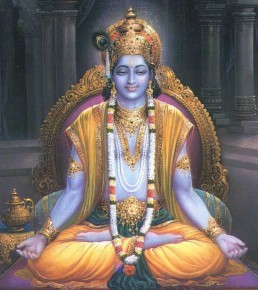Swami Chinmayananda
Swami Chinmayananda Commentary
A “doer” belonging to the PASSIONATE type is being exhaustively painted here. He is full of desires, passions and attachments, and he tenaciously clings on to some wished-for gain or goal. He is swayed by passion (raaga) and eagerly seeks the fruit of his work. He is ever greedy (Lubdhah) in the sense that such a Rajasic “doer” is never satisfied with what he gains and greedily thirsts for more. His thirst is insatiable because his desires multiply from moment to moment.
When a man, full of desires and passions, works with mounting greed, he naturally becomes very malignant (Himsaatmakah) in his programmes of pursuit. He never hesitates to injure another, if such injury were to win his end. He is blind to the amount of sorrow he might bring to others; he is concerned only with the realisation of his ulterior motives. When a man of this type (with the above qualities) becomes maliciously resolved to gain his own ends, it is but natural that he becomes impure (Ashuchih), meaning “immoral.”
Even unrighteous methods and vulgar immoralities are no ban to such a “doer” and he will pursue them, if his particular desire can be fulfilled thereby. He may ordinarily be quite a moral and righteous man, but the beauty of his composure and the steadiness of his morality, expressed during his quieter moments, all fly away as brilliant splinters when the sledge hammer of his greed and passion, vengeful plans and malignant schemes, thuds upon his heart.
It is but natural that such a PASSIONATE “doer,” when he acts in his blinding desires, comes to live, all through his embodied existence, a sad life of agitations, moved by joys and sorrows, “full of delight and grief,” (Harsha-Shoka-Anvitah). This completes the picture of a man who is a ‘passionate’ (Rajasic) “doer.”
AND HOW DOES A TAMASIC “DOER” FUNCTION IN THE FIELD OF ACTIVITY?
Adi Sankara Commentary
Karta, the agent; ragi, who has attachment; karma-phala-prepsuh, who is desirous of the results of actions; lubdhah, covetous, greedy for other’s property, and does not part with his own (when) at holy places; himsatmakah, cruel by nature, having a nature that cuases pain to others; asucih, unclean, devoid of internal and external cleanliness; and harsa-soka-anvitah, subject to joy and sorrow, affected by these two, joy and sorrow-joy at the acquisition of desired objects, sorrow at getting undesired objects and losing coverted objects; and elation and dejection may occur to that very person from his actions being aided or hindered; one who is subject to those-; parikirtitah, is declared to be; rajasah, possessed of rajas.
The Bhagavad Gita with the commentary of Sri Sankaracharya – Translated by Alladi Mahadeva Sastry
Holy Geeta – Commentary by Swami Chinmayananda
The Bhagavad Gita by Eknath Easwaran – Best selling translation of the Bhagavad Gita
The Bhagavad Gita – Translation and Commentary by Swami Sivananda
Bhagavad Gita – Translation and Commentary by Bhaktivedanta Swami Prabupadha
Srimad Bhagavad Gita Chapter 18 – Verse 27 – 18.27 ragi karmaphalaprepsur – All Bhagavad Gita (Geeta) Verses in Sanskrit, English, Transliteration, Word Meaning, Translation, Audio, Shankara Bhashya, Adi Sankaracharya Commentary and Links to Videos by Swami Chinmayananda and others – 18-27

